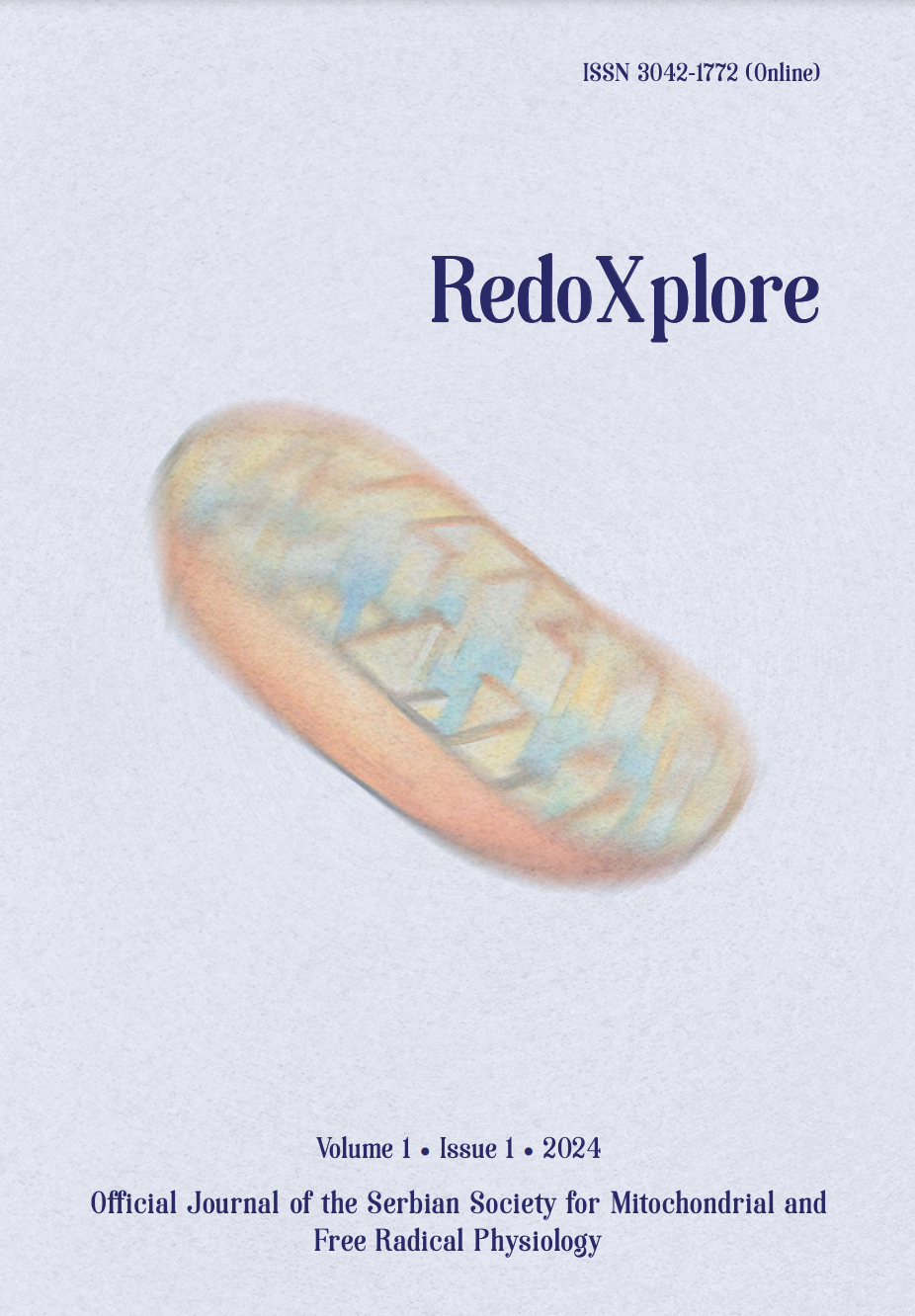
More articles from Volume 1, Issue 1, 2024
REDOX AND METABOLIC REPROGRAMMING OF BREAST CANCER CELLS AND ASSOCIATED ADIPOSE TISSUE - THE CORNERSTONES OF ADAPTIVE TUMOUR BEHAVIOUR
INSULIN MODULATES MITOCHONDRIAL STRUCTURAL AND FUNCTIONAL MOSAICISM IN BROWN ADIPOCYTES
NITRITE MITIGATES OXIDATIVE BURST IN ISCHEMIA/REPERFUSION IN BRAIN SLICES
NITRIC OXIDE, SUPEROXIDE AND PEROXYNITRITE – REDOX REGULATION OF THE CARDIOVASCULAR SYSTEM BY NITRO-OXIDATIVE STRESS AND S-NITROS(YL)ATION
DIETARY NITRATE AS PIVOT ON THE GUT MICROBIOTA-HOST REDOX COMMUNICATION
Citations

0
THE ROLE OF MACROPHAGE MIGRATION INHIBITORY FACTOR IN LIVER INFLAMMATION, OXIDATIVE STRESS, AND APOPTOSIS IN MICE ON A FRUCTOSE DIET
Department of Biochemistry, Institute for Biological Research "Siniša Stanković"-National Institute of the Republic of Serbia, University of Belgrade , Belgrade , Serbia
Department of Biochemistry, Institute for Biological Research "Siniša Stanković"-National Institute of the Republic of Serbia, University of Belgrade , Belgrade , Serbia
Department of Biochemistry, Institute for Biological Research "Siniša Stanković"-National Institute of the Republic of Serbia, University of Belgrade , Belgrade , Serbia
Department of Biochemistry, Institute for Biological Research "Siniša Stanković"-National Institute of the Republic of Serbia, University of Belgrade , Belgrade , Serbia
Department of Biochemistry, Institute for Biological Research "Siniša Stanković"-National Institute of the Republic of Serbia, University of Belgrade , Belgrade , Serbia
Department of Biochemistry, Institute for Biological Research "Siniša Stanković"-National Institute of the Republic of Serbia, University of Belgrade , Belgrade , Serbia
Department of Biochemistry, Institute for Biological Research "Siniša Stanković"-National Institute of the Republic of Serbia, University of Belgrade , Belgrade , Serbia
Editor: Bato Korac
Published: 29.08.2024.
Short oral presentations
Volume 1, Issue 1 (2024)
Abstract
Macrophage migration inhibitory factor (MIF) is a pleiotropic cytokine that plays an essential role in the inflammatory response and various other biological effects such as activation of apoptosis and oxidative stress. Fructose-enriched diets have previously been associated with the development of low-grade inflammation leading to metabolic stress. The aim of the present study was to investigate the combined effects of deletion of the Mif gene and a 9-week 20% fructose-enriched diet on metabolic inflammation, apoptosis, and oxidative stress in the liver of wild-type (WT) and Mif knockout (MIF−/−) male C57Bl/6J mice. We analyzed liver histology and expression of pro-inflammatory genes: Tumor necrosis factor (TNF), interleukin 1β (IL-1β), and IL-6. Antioxidant activity was estimated by the protein levels of antioxidant enzymes catalase (CAT), superoxide dismutase (SOD1), mitochondrial MnSOD (SOD2), glutathione reductase (GR) and glutathione peroxidase (GPX). The results showed that antioxidant protection was activated in the liver of MIF-deficient mice. Increased hepatic expression of the cytokines IL-6 and IL-1β was observed in the same animals. Histologic analysis confirmed the presence of apoptosis, inflammation, enlarged Kupffer cells, and regenerative changes, such as binucleated hepatocytes, anisonucleosis, and anisocytosis. In addition, confluent and focal necrosis was observed in the liver of MIF−/− mice, which was even more pronounced in the animals consuming fructose. In conclusion, MIF may play a protective role in metabolic stress, as inflammation, oxidative stress, apoptotic and necrotic changes occur in the liver in its absence.
Citation
Copyright

This work is licensed under a Creative Commons Attribution-NonCommercial-ShareAlike 4.0 International License.
Article metrics
The statements, opinions and data contained in the journal are solely those of the individual authors and contributors and not of the publisher and the editor(s). We stay neutral with regard to jurisdictional claims in published maps and institutional affiliations.






